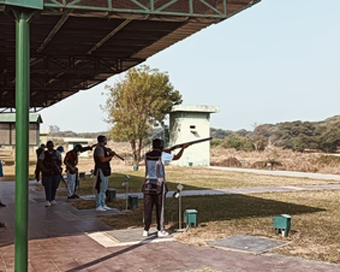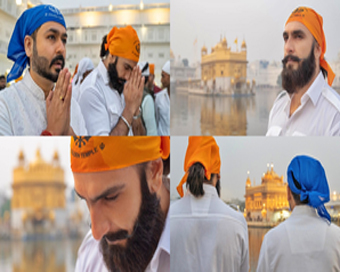 PM Modi visit USA
PM Modi visit USA Only the mirror in my washroom and phone gallery see the crazy me : Sara Khan
Only the mirror in my washroom and phone gallery see the crazy me : Sara Khan Karnataka rain fury: Photos of flooded streets, uprooted trees
Karnataka rain fury: Photos of flooded streets, uprooted trees Cannes 2022: Deepika Padukone stuns at the French Riviera in Sabyasachi outfit
Cannes 2022: Deepika Padukone stuns at the French Riviera in Sabyasachi outfit Ranbir Kapoor And Alia Bhatt's Wedding Pics - Sealed With A Kiss
Ranbir Kapoor And Alia Bhatt's Wedding Pics - Sealed With A Kiss Oscars 2022: Every Academy Award Winner
Oscars 2022: Every Academy Award Winner Shane Warne (1969-2022): Australian cricket legend's life in pictures
Shane Warne (1969-2022): Australian cricket legend's life in pictures Photos: What Russia's invasion of Ukraine looks like on the ground
Photos: What Russia's invasion of Ukraine looks like on the ground Lata Mangeshkar (1929-2022): A pictorial tribute to the 'Nightingale of India'
Lata Mangeshkar (1929-2022): A pictorial tribute to the 'Nightingale of India' PM Modi unveils 216-feet tall Statue of Equality in Hyderabad (PHOTOS)
PM Modi unveils 216-feet tall Statue of Equality in Hyderabad (PHOTOS)India Open Competition in Shotgun, organised by the National Rifle Association of India (N
- Hockey India names Amir Ali-led 20-man team for Junior Asia Cup
- Harmanpreet Singh named FIH Player of the Year, PR Sreejesh gets best goalkeeper award
- World Boxing medallist Gaurav Bidhuri to flag off 'Delhi Against Drugs' movement on Nov 17
- U23 World Wrestling Championship: Chirag Chikkara wins gold as India end campaign with nine medals
- FIFA president Infantino confirms at least 9 African teams for the 2026 World Cup
Delhi air toxic but better than last year Last Updated : 20 Oct 2017 07:50:50 PM IST 
File photo of Delhi
The air quality in Delhi and its adjoining areas was toxic and a thick blanket of smoke hung in the skies on Friday as lung-clogging particulate matter, PM2.5, went beyond dangerous levels, a night after Diwali revellers burst firecrackers despite a Supreme Court ban on their sale.
The average air quality index on Friday was between 370-400, which was better than last year when it measured 445.
According to the Central Pollution Control Board (CPCB) portal, the average PM2.5 level in Delhi and NCR on Friday was 181 micrograms per cubic metre, significantly lower compared to the day after Diwali in 2016 when it measured 343 micrograms per cubic metre. The satisfactory limit of PM2.5 is 60 micrograms per cubic metre.
PM2.5 are fine particulate matter that can enter lungs and get absorbed in the bloodstream, and can cause respiratory problems, cardiovascular diseases and even lung cancer.
"The share of PM2.5 increased during Diwali period and became 60-70 per cent which made air quality more toxic," according to the System of Air Quality and Weather Forecasting and Research (SAFAR) of the Union Ministry of Earth Sciences.
According to the data recorded by air quality monitoring stations of the CPCB, levels of PM2.5 touched alarmingly severe levels in at least 12 centres where it ranged between 406 and 416 at 7 p.m. The severe level means that air pollution can even affect healthy people and seriously impact those with existing diseases.
The air quality index was recorded "very poor" at seven stations - where it ranged between 321 and 394 at 7 p.m. The index value between 300 and 400 is considered "very poor" that can cause respiratory illness on prolonged exposure.
The air quality is likely to improve on Sunday in Delhi and adjoining Gurugram and Noida satellite towns. The region remained engulfed in a thick haze almost through the day, after the Diwali night that was less noisy than previous years.
The Supreme Court ban on sale of firecrackers didn't prevent people from lighting sparklers, rockets and loud Diwali "bombs" though the volume was lower than previous years. Some people claimed to have travelled out of the city or shopped online to buy firecrackers, while many claimed they used last year's leftover stock to celebrate Diwali.
The court on October affirmed the ban it had imposed on the sale of firecrackers in the Delhi and NCR. The court said the ban would be lifted at the end of this month if there was any positive effect during Diwali.
Experts, however, opined that the Supreme Court ban on the sale was just not enough.
Sunil Dahiya, a Greenpeace India activist, said: "There is enough evidence to prove the regional and comprehensive nature of air pollution. The need today is to curb the major sources of pollution along with curbing the episodic sources, such as Diwali firecrackers, to achieve breathable air throughout the year, and across geographies."
IANS For Latest Updates Please-
Join us on
Follow us on








172.31.16.186







